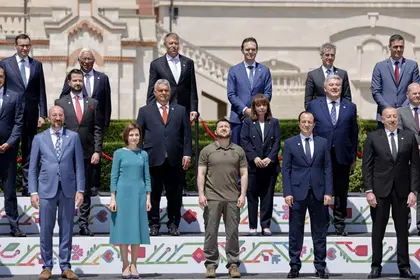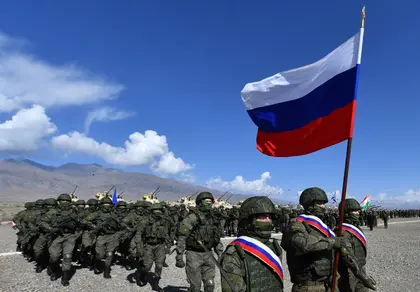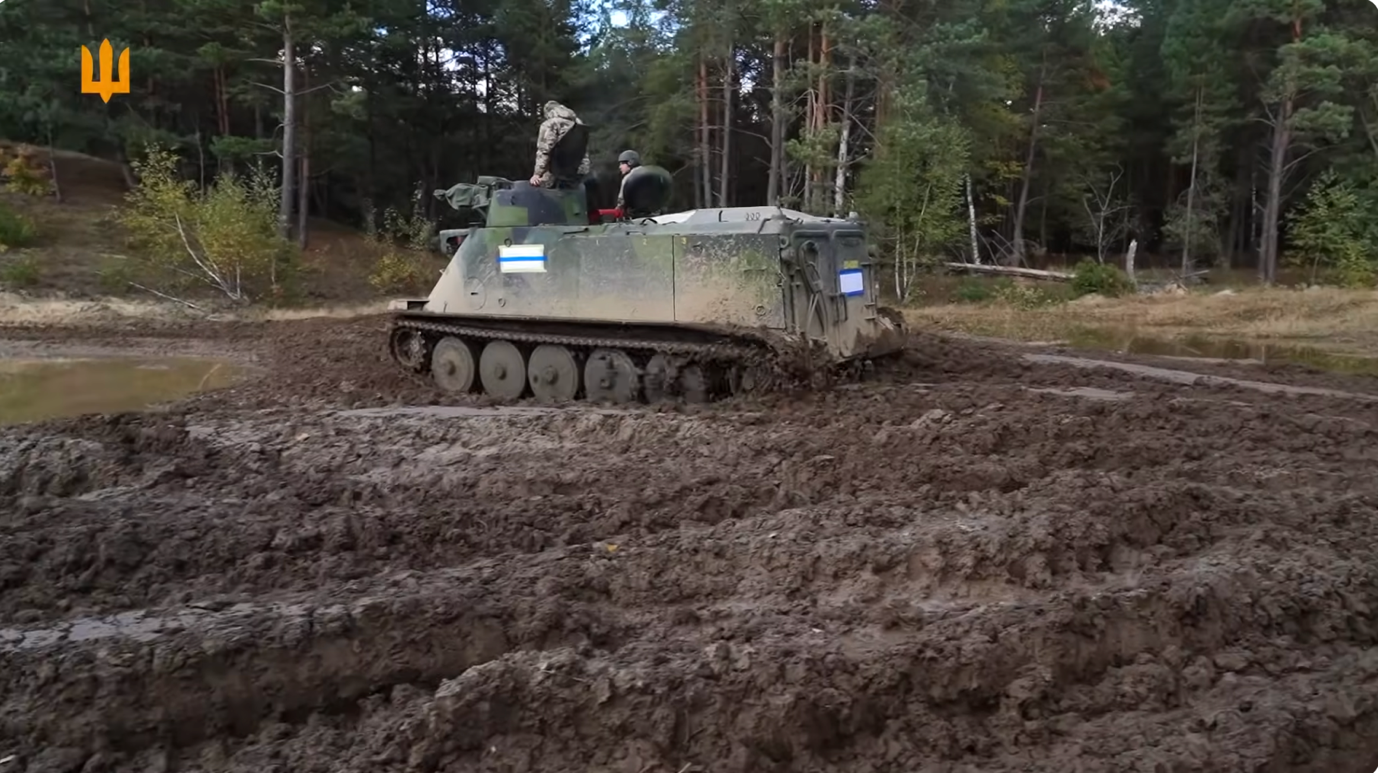Amid various options and opinions expressed by Europe’s political leaders at their Moldovan summit meeting this week, Ukraine’s future NATO membership and security still look as clear as mud.
Both during official sessions and on the sidelines of yesterday’s summit of the European Political Community (EPC), discussions about Ukraine joining NATO and what Ukraine and its allies would do if the country were again attacked yielded no clarity, consensus or commitment.
JOIN US ON TELEGRAM
Follow our coverage of the war on the @Kyivpost_official.
Zelensky: Make Us NATO, But You Better Deliver If You Don’t
With a morass before him, a potentially frustrated Ukrainian President Volodymyr Zelensky continued to directly press for NATO membership, while also questioning what his allies will do for Ukraine when they get to the NATO Summit in Lithuania in July.
“We must do everything so that Ukraine gets some steps forward in rapprochement with the Alliance and we should receive this signal from NATO countries,” Zelensky said.
According to Zelensky, if Ukraine had been in NATO, Russia would not have attacked.
“This suggests that the best security guarantees are in NATO,” Zelensky said when asked about the possibility of security guarantees outside NATO members’ obligations to defend each other if attacked.
“We had the Budapest Memorandum… We know what happened: we gave up nuclear weapons and should have received protection and support at least for the sovereignty and territorial integrity of Ukraine,” he said.

Germany's Baerbock Offers Ukraine No Guarantees as Kyiv Sounds Alarm
“Are there security guarantees other than NATO? You probably have to think that. We would like to have NATO guarantees. And, while we are not in NATO, we want to have security guarantees, [which send] a clear signal that [allies] will act until Ukraine is in NATO,” Zelensky said.
It therefore seems that Zelensky is putting forward Ukraine’s best-case scenario – NATO membership or at least a clear route to it – and its less preferred scenario – some other agreements that obligate allies to decisively respond if Ukraine is again attacked.
Zelensky’s Foreign Minister Dmytro Kuleba tweeted the Ukrainian position prior to the Moldovan talkfest.
As Kyiv Post has previously reported, the draft Kyiv Security Compact, which would see allies make bilateral commitments to defend Ukraine, is one potential alternative, and is similar to the long-term security guarantees that Israel receives from the US.
Options for Ukraine’s Security
Option A: NATO Membership for Ukraine Starts at Vilnius
This option is mostly supported by Ukraine’s immediate neighbors, such as Poland and Slovakia, and other countries that neighbor Russia, which are the Baltic nations. It does not appear likely at this stage, given statements by Ukrainian officials themselves.
Indeed, if the comments of NATO leaders can be deciphered, there may be other options up for development and consideration as the Vilnius meeting draws nearer.
Option B: Yes to Guarantees Now and Maybe No, Maybe Yes to NATO Later
In Moldova, German Chancellor Olaf Scholz indicated that Ukraine’s security guarantees and NATO membership should be differentiated.
“Given the current situation, [NATO] membership is out of the question,” Scholz said. “We should all focus on how we, as citizens, can support Ukraine.”
“[Security guarantees] must be designed to provide Ukraine with the necessary security against the threat of attack, so that they simultaneously stabilize Ukraine... and of course, this is always part of a security guarantee that it is taken seriously.”
A critical part of the German position is that it does not open the door to potential Ukrainian NATO membership.
In Moldova, French President Emmanuel Macron said he supports “stronger, concrete, very clear security guarantees” for Ukraine, and added he would hold talks on this issue with Scholz.
“We must give Ukraine a long-term perspective. It is extremely important that the summit in Vilnius gives these immediate guarantees,” the French leader said.
Macron did not, however, repeat his statement from earlier in the week where, for the first time, he suggested there might be a “path towards” membership for Ukraine.
Option C: Yes to Guarantees Now and Yes to NATO Later
In addition to many of its Western and Baltic neighbors who are NATO members, other major Ukraine allies now want to go further than the apparent Franco-German cautious approach.
In Moldova, Rishi Sunak, the UK’s Prime Minister, reaffirmed support for Ukraine’s future NATO membership but did not provide many details of London’s position on Ukraine’s path to membership in the Alliance.
“I agree with the NATO Secretary General that Ukraine’s rightful place is in NATO, and what we are also talking about with Ukraine now is to ensure that they have all the necessary support for a successful counteroffensive,” he said.
“We want to be sure that we have created security mechanisms for Ukraine for the long term, so we are sending a very strong signal to Vladimir Putin that we are not going anywhere. We will be here and will continue to support Ukraine – not only now, but also in future years,” Sunak stressed.
“We considered Ukraine’s expectations from the Vilnius NATO summit. It is important for Ukraine to get a clear signal about the prospects of membership in the Alliance, which will be another motivating factor for the Armed Forces of Ukraine and the entire Ukrainian people,” he later added on Twitter.
The British position is more closely aligned with increasingly “hawkish” US statements about Ukraine’s security, including in the short term.
US Secretary of State Antony Blinken told an informal meeting of foreign ministers of allied countries in Oslo yesterday that at Vilnius “our friends in Ukraine can anticipate a very robust package of both political and practical support.”
According to Blinken, NATO is focused on strengthening the relationship between Ukraine and NATO and bringing Ukraine up to NATO standards.
His comments come as Washington Post yesterday reported on increasingly “hawkish” positions in the White House regarding Russia.
A White House source told Washington Post yesterday that Blinken and National Security Advisor Jake Sullivan believe that the benefits of providing Ukraine with more powerful weapons outweigh the risks of escalation and is actively cooperating with European allies to provide Ukraine with F-16 fighter aircraft.
“Unquestionably, the Biden administration’s willingness to cross Putin’s red lines has bolstered Ukraine’s ability to defend itself and recapture territory in the east and south,”the source said.
Somewhere amid the words, posturing and diplomatic gestures of his colleagues in the international community, the man for whom Ukraine’s security matters most could be left wondering: If not NATO membership, who will be the guarantor of Ukraine’s security?
You can also highlight the text and press Ctrl + Enter






